
views
Using Possessive Apostrophes
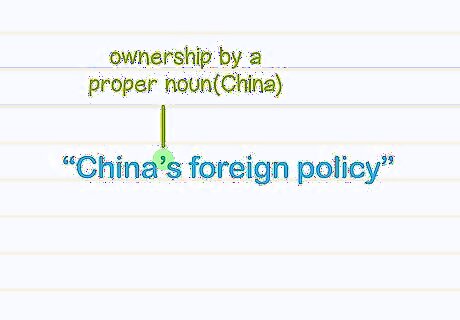
Use an apostrophe to indicate ownership by a proper noun. An apostrophe with an "s" after a proper noun indicates that the person, place or thing owns whatever noun follows his or her name. For example, "Mary's lemons." We know the lemons belong to Mary because of the 's. Other examples include "China's foreign policy" and "the orchestra's conductor." Ownership with certain proper nouns can be tricky. "Sunday's football game" is not technically correct (because Sunday is incapable of ownership) but it's perfectly acceptable to say and write. "A hard day's work" is likewise perfectly correct, even though the day is incapable of ownership.
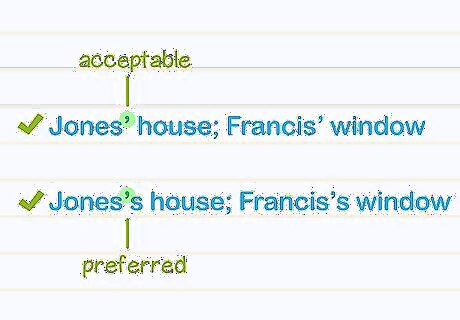
Be consistent when you use apostrophes after words that end in "s." When someone's name ends with an "s," it is acceptable to use an apostrophe without an "s" to show ownership, but linguists with the Chicago Manual of Style, along with others, prefer to add an "s" after the apostrophe. Note the difference in usage: Acceptable: Jones' house; Francis' window; Enders' family. Preferred: Jones's house; Francis's window; Enders's family. Whichever style you prefer using, be consistent with it. It doesn't really matter which policy you adopt, as long as you adopt it consistently.
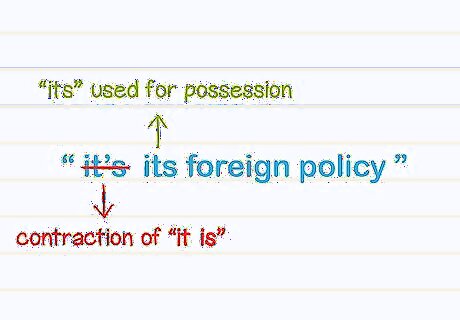
Don't use an apostrophe to indicate ownership when using "it". "China's foreign policy" is correct, but say your reader already knows you're talking about China, and you start referring to the country as "it." If you were to reference something China owned in this way, you'd say "its foreign policy." The reason for this is to avoid confusion between "its" used for possession and "it's" used as a contraction of "it is." If you're not sure whether to use an apostrophe or not, try saying the sentence with "it is" or "it has." If it doesn't make sense (the way that "it is foreign policy" cannot substitute for "China's foreign policy"), then drop the apostrophe.
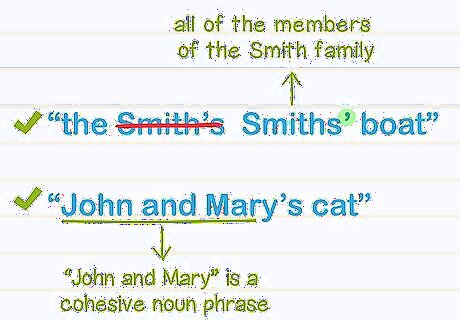
Use apostrophes to indicate ownership by a plural noun. One common trip-up on apostrophe usage for a plural group occurs when people want to discuss what a family owns. For instance, say the Smart family lives across the street from you and owns a boat. The boat is "the Smarts' boat," not "the Smart's boat." Because you are talking about all of the members of the Smart family, you would start with "Smarts." Because all the Smarts (presumably) own the boat, you add the apostrophe after the "s." If the family's last name ends in "s," make it plural before adding an apostrophe. For instance, if you wanted to discuss the Williams family, they would become "the Williamses" in a plural sense. If you wanted to reference their dog, you'd say "the Williamses' dog." If the last name seems awkward to say that way, sidestep the issue by saying "the Williams family" and "the Williams family's dog." If you're listing who owns an object, know where to put the apostrophe. For instance, if both John and Mary own a cat, you would write "John and Mary's cat" — not "John's and Mary's cat." "John and Mary" is a cohesive noun phrase, and therefore only needs one apostrophe.
Avoiding Apostrophes for Plurals
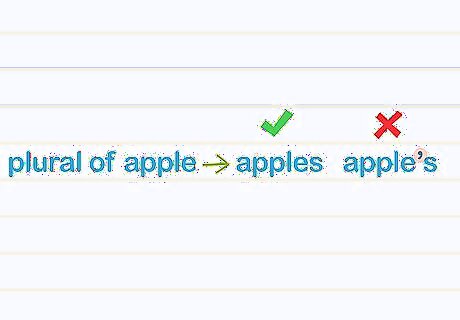
In general, don't use an apostrophe to indicate a plural. The wrong use of an apostrophe to form the plural is called the greengrocer's apostrophe, since grocers are often the worst (or at least the most visible) offenders. If you have more than one apple, then write apples, not apple's. An occasional exception to this use is in the case of making a single letter plural. Therefore, Why are there so many i's in the word "indivisibility"? is correct, depending on who you ask. This is simply for clarity reasons, so the reader does not mistake it for the word "is." However, in modern usage, the preference is to avoid inserting an apostrophe and instead surround the single letter in quotation marks before pluralizing it: Why are there so many "i"s in the word "indivisibility"? Avoid the problem altogether with small numbers by spelling out the word: "ones" instead of "1's," "fours" instead of "4's" or "nines" instead of "9's." Only spell out words of numerals that are ten or lower.
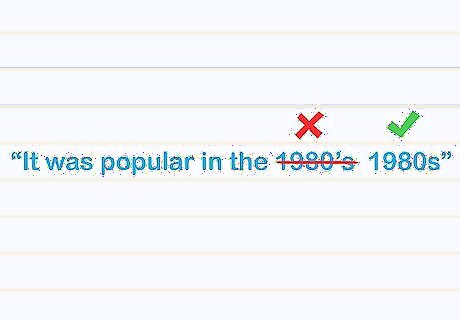
Know how to use apostrophes for acronyms and years. Say you use an acronym for a noun, like CD. To make CD plural, use "CDs," not CD's." The same logic goes for years — instead of writing "Spandex was popular in the 1980's," use "1980s." The only time an apostrophe should be used in a year is if it's standing in for omitted numbers. For instance, if you wanted to shorten the year 2005, you could write '05. In this case, the apostrophe is essentially acting like it does in a contraction and serving as shorthand.
Using Apostrophes in Contractions
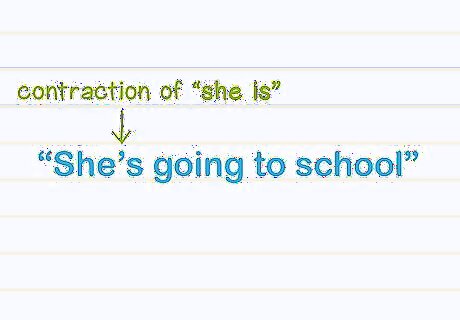
Use apostrophes in contractions. Sometimes, especially in informal writing, apostrophes are used to indicate one or more missing letters. For example, the word "don't" is short for "do not"; other examples include "isn't," "wouldn't," and "can't." Contractions can also be made with the verbs "is," "has," and "have." For example, we can write "She's going to school" instead of "She is going to school"; or "He's lost the game" instead of "He has lost the game."
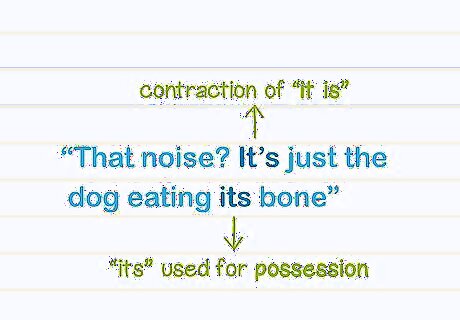
Be aware of the its/it's trap. Use an apostrophe with the word "it" only when you want to indicate a contraction for "it is" or "it has. It is a pronoun, and pronouns have their own possessive form that does not use an apostrophe. For example, "That noise? It's just the dog eating its bone." This may seem confusing, but it follows the same pattern as other possessive pronouns: his, hers, its, yours, ours, theirs.
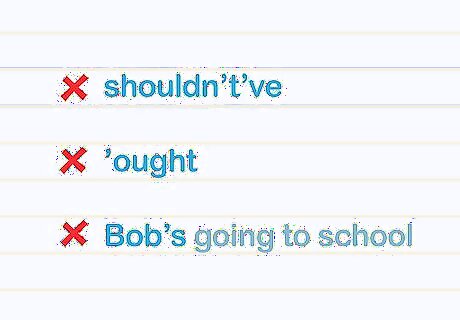
Avoid using contractions that don't exist. Many people use informal contractions such as "shouldn't've" or "'ought." These contractions aren't real contractions, so avoid using them in formal writing. Another mistake to avoid is using people's names in contractions. For example, if you use "Bob's" as a contraction of "Bob is," then that's not correct. "Bob's" is supposed to be a possessive, not a contraction. It's okay to use pronouns in contractions such as "he's" or "she's."













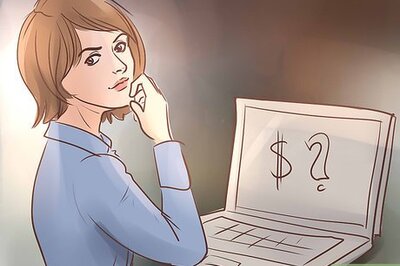



Comments
0 comment